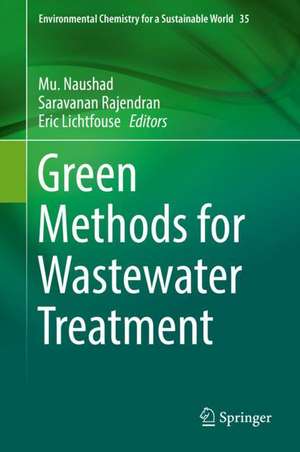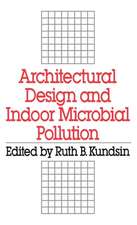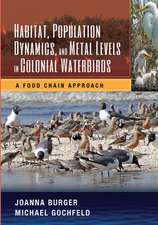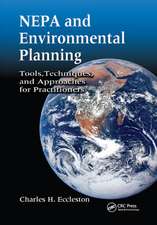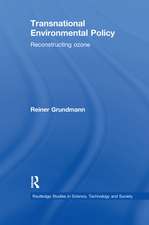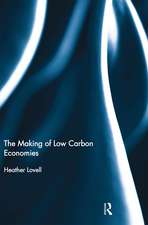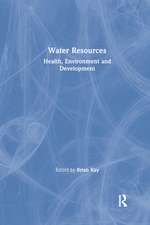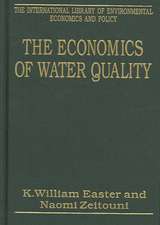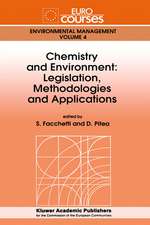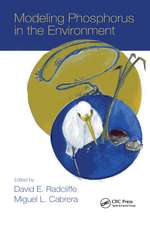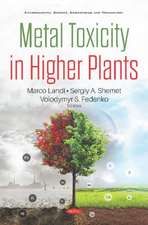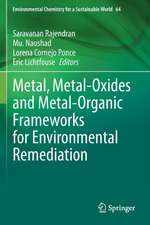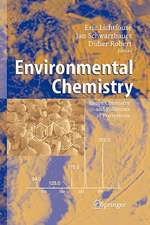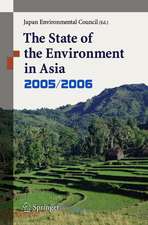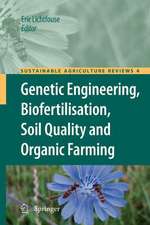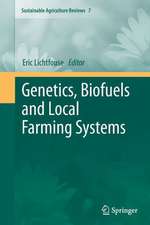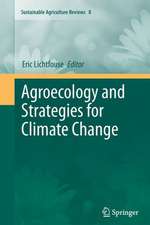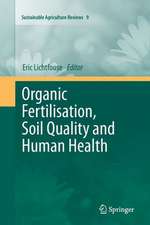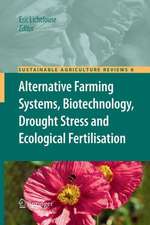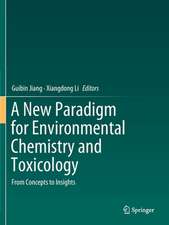Green Methods for Wastewater Treatment: Environmental Chemistry for a Sustainable World, cartea 35
Editat de Mu. Naushad, Saravanan Rajendran, Eric Lichtfouseen Limba Engleză Hardback – 8 iul 2019
| Toate formatele și edițiile | Preț | Express |
|---|---|---|
| Paperback (1) | 945.14 lei 6-8 săpt. | |
| Springer International Publishing – 15 aug 2020 | 945.14 lei 6-8 săpt. | |
| Hardback (1) | 745.64 lei 38-44 zile | |
| Springer International Publishing – 8 iul 2019 | 745.64 lei 38-44 zile |
Din seria Environmental Chemistry for a Sustainable World
- 18%
 Preț: 1118.45 lei
Preț: 1118.45 lei - 15%
 Preț: 645.79 lei
Preț: 645.79 lei - 15%
 Preț: 653.14 lei
Preț: 653.14 lei - 15%
 Preț: 648.24 lei
Preț: 648.24 lei - 15%
 Preț: 643.34 lei
Preț: 643.34 lei - 15%
 Preț: 651.51 lei
Preț: 651.51 lei - 15%
 Preț: 646.62 lei
Preț: 646.62 lei - 18%
 Preț: 956.81 lei
Preț: 956.81 lei - 18%
 Preț: 959.98 lei
Preț: 959.98 lei - 15%
 Preț: 646.62 lei
Preț: 646.62 lei - 18%
 Preț: 1389.30 lei
Preț: 1389.30 lei - 18%
 Preț: 1229.10 lei
Preț: 1229.10 lei - 18%
 Preț: 1001.81 lei
Preț: 1001.81 lei - 18%
 Preț: 1118.62 lei
Preț: 1118.62 lei - 18%
 Preț: 899.21 lei
Preț: 899.21 lei - 18%
 Preț: 1120.18 lei
Preț: 1120.18 lei - 18%
 Preț: 896.08 lei
Preț: 896.08 lei - 18%
 Preț: 788.72 lei
Preț: 788.72 lei - 18%
 Preț: 1009.70 lei
Preț: 1009.70 lei - 15%
 Preț: 650.86 lei
Preț: 650.86 lei - 15%
 Preț: 646.62 lei
Preț: 646.62 lei - 18%
 Preț: 1017.62 lei
Preț: 1017.62 lei - 18%
 Preț: 1118.62 lei
Preț: 1118.62 lei - 15%
 Preț: 644.95 lei
Preț: 644.95 lei - 5%
 Preț: 915.58 lei
Preț: 915.58 lei - 24%
 Preț: 751.40 lei
Preț: 751.40 lei - 18%
 Preț: 1008.12 lei
Preț: 1008.12 lei - 18%
 Preț: 1113.89 lei
Preț: 1113.89 lei - 18%
 Preț: 950.52 lei
Preț: 950.52 lei - 18%
 Preț: 959.98 lei
Preț: 959.98 lei - 15%
 Preț: 648.42 lei
Preț: 648.42 lei - 18%
 Preț: 950.96 lei
Preț: 950.96 lei - 23%
 Preț: 852.88 lei
Preț: 852.88 lei - 18%
 Preț: 959.50 lei
Preț: 959.50 lei - 20%
 Preț: 647.13 lei
Preț: 647.13 lei - 24%
 Preț: 744.58 lei
Preț: 744.58 lei - 18%
 Preț: 1215.22 lei
Preț: 1215.22 lei - 20%
 Preț: 570.17 lei
Preț: 570.17 lei - 24%
 Preț: 824.15 lei
Preț: 824.15 lei - 15%
 Preț: 647.59 lei
Preț: 647.59 lei
Preț: 745.64 lei
Preț vechi: 981.10 lei
-24% Nou
Puncte Express: 1118
Preț estimativ în valută:
142.67€ • 148.98$ • 117.82£
142.67€ • 148.98$ • 117.82£
Carte tipărită la comandă
Livrare economică 11-17 aprilie
Preluare comenzi: 021 569.72.76
Specificații
ISBN-13: 9783030164263
ISBN-10: 3030164268
Pagini: 272
Ilustrații: XV, 292 p. 84 illus.
Dimensiuni: 155 x 235 mm
Greutate: 0.61 kg
Ediția:1st ed. 2020
Editura: Springer International Publishing
Colecția Springer
Seria Environmental Chemistry for a Sustainable World
Locul publicării:Cham, Switzerland
ISBN-10: 3030164268
Pagini: 272
Ilustrații: XV, 292 p. 84 illus.
Dimensiuni: 155 x 235 mm
Greutate: 0.61 kg
Ediția:1st ed. 2020
Editura: Springer International Publishing
Colecția Springer
Seria Environmental Chemistry for a Sustainable World
Locul publicării:Cham, Switzerland
Cuprins
Chapter 1. Visible-Light-responsive Nanostructured Materials for Photocatalytic Degradation of Persistent Organic Pollutants in Water.- Chapter 2. Surface Modification of Highly Magnetic Nanoparticles for Water Treatment to Remove Radioactive Toxins.- Chapter 3. FeS2 Pyrite Nanostructures: An Efficient Performer in Photocatalysis.- Chapter 4. Green Synthesized Metal Oxide Nanomaterials Photo Catalysis in Combating Bacterial Infection.- Chapter 5. Progression in Fenton Process for the Waste Water Treatment.- Chapter 6. Electrochemical Aspects for Wastewater Treatment.- Chapter 7. TiO2 Based Nanocomposites for Photodegradation of Organic Dyes.- Chapter 8. Light Activated Nanoparticles for Antibacterial Studies.- Chapter 9. Green Technologies for Wastewater Treatment.- Chapter 10. Mesoporous Materials for Degradation of Textile Dyes.
Notă biografică
Dr. Mu. Naushad is presently working as an Associate Professor in the Department of Chemistry, College of Science, King Saud University (KSU), Riyadh, Kingdom of Saudi Arabia. He obtained his M.Sc and Ph.D Degree in Analytical chemistry from Aligarh Muslim University, Aligarh, India in 2002 and 2007, respectively. He has a vast research experience in the multidisciplinary fields of Analytical Chemistry, Materials Chemistry and Environmental Science. He holds several US patents, over 250 publications in the international Journals of repute, twenty book chapters and several books published by renowned international publishers. He has >5800 citations with a Google Scholar H-Index of >47. He has successfully run several research projects funded by National plan for Science, Technology and Innovation (NPST) and King Abdulaziz City for Science and Technology (KACST), Kingdom of Saudi Arabia. He is the editor/editorial member of several reputed Journals like Scientific Report (Nature); Process Safety & Environmental Protection (Elsevier); Journal of Water Process Engineering (Elsevier) and International Journal of Environmental Research & Public Health (MDPI). He is also the associate editor for Environmental Chemistry Letters (Springer) and Desalination & Water Treatment (Taylor & Francis). He has been awarded the Scientist of the year award-2015 from National Environmental Science Academy, Delhi, India and Almarai Award-2017, Saudi Arabia.
Dr. Saravanan Rajendran has received his Ph.D in Physics-Material Science in 2013 from the Department of Nuclear Physics, University of Madras, Chennai, India. He was awarded the University Research Fellowship (URF) during the year 2009-2011 by the University of Madras. After working as an Assistant Professor in Dhanalakshmi College of Engineering, Chennai, India during the year of 2013-2014, he was awarded SERC and CONICYT-FONDECYT post-doctoral fellowship, University of Chile, Santiagoin the year of 2014- 2017. He has worked (2017-2018) in the research group of Professor John Irvine, School of Chemistry, University of St Andrews, UK as a Postdoctoral Research Fellow within the framework of a EPSRC-Global Challenges Research Fund for the removal of Blue-Green Algae and their toxins. Currently, he is working as a Research Scientist, in the School of Mechanical Engineering (EUDIM), University of Tarapacá, Arica, Chile. Also, Research Associate in SERC, University of Chile, Santiago, Chile. He is Associate Editor for International Journal of Environmental Science and Technology (Springer). His research interests focuses in the area of nanostructured functional materials, photophysics, surface chemistry and nanocatalysts for renewable energy and waste water purification. He has published several International peer-reviewed Journals, five book chapters and three books published by renowned international publishers.
Dr. Eric Lichtfouse (PhD), born in1960, is an environmental chemist working at the University of Aix-Marseille, France. He has invented carbon-13 dating, a method allowing to measure the relative age and turnover of molecular organic compounds occurring in different temporal pools of any complex media. He is teaching scientific writing and communication, and has published the book Scientific Writing for Impact Factors, which includes a new tool – the Micro-Article - to identify the novelty of research results. He is founder and Chief Editor of scientific journals and series in environmental chemistry and agriculture. He got the Analytical Chemistry Prize by the French Chemical Society, the Grand Prize of the Universities of Nancy and Metz, and a Journal Citation Award by the Essential Indicators.
Dr. Saravanan Rajendran has received his Ph.D in Physics-Material Science in 2013 from the Department of Nuclear Physics, University of Madras, Chennai, India. He was awarded the University Research Fellowship (URF) during the year 2009-2011 by the University of Madras. After working as an Assistant Professor in Dhanalakshmi College of Engineering, Chennai, India during the year of 2013-2014, he was awarded SERC and CONICYT-FONDECYT post-doctoral fellowship, University of Chile, Santiagoin the year of 2014- 2017. He has worked (2017-2018) in the research group of Professor John Irvine, School of Chemistry, University of St Andrews, UK as a Postdoctoral Research Fellow within the framework of a EPSRC-Global Challenges Research Fund for the removal of Blue-Green Algae and their toxins. Currently, he is working as a Research Scientist, in the School of Mechanical Engineering (EUDIM), University of Tarapacá, Arica, Chile. Also, Research Associate in SERC, University of Chile, Santiago, Chile. He is Associate Editor for International Journal of Environmental Science and Technology (Springer). His research interests focuses in the area of nanostructured functional materials, photophysics, surface chemistry and nanocatalysts for renewable energy and waste water purification. He has published several International peer-reviewed Journals, five book chapters and three books published by renowned international publishers.
Dr. Eric Lichtfouse (PhD), born in1960, is an environmental chemist working at the University of Aix-Marseille, France. He has invented carbon-13 dating, a method allowing to measure the relative age and turnover of molecular organic compounds occurring in different temporal pools of any complex media. He is teaching scientific writing and communication, and has published the book Scientific Writing for Impact Factors, which includes a new tool – the Micro-Article - to identify the novelty of research results. He is founder and Chief Editor of scientific journals and series in environmental chemistry and agriculture. He got the Analytical Chemistry Prize by the French Chemical Society, the Grand Prize of the Universities of Nancy and Metz, and a Journal Citation Award by the Essential Indicators.
Textul de pe ultima copertă
This book presents comprehensive chapters on the latest research and applications in wastewater treatment using green technologies. Topics include mesoporous materials, TiO2 nanocomposites and magnetic nanoparticles, the role of catalysts, treatment methods such as photo-Fenton, photocatalysis, electrochemistry and adsorption, and anti-bacterial solutions. This book will be useful for chemical engineers, environmental scientists, analytical chemists, materials scientists and researchers.
Caracteristici
This book presents the latest advance in research, innovations, and applications in the field of wastewater treatment using green technologies Topics discussed are applications of various types of materials such as mesoporous materials; TiO2 based nanocomposites and magnetic nanoparticles for wastewater treatment This book will be useful for chemical engineers, environmental scientists, analytical chemists, materials scientists and researchers working in the field of wastewater treatment
